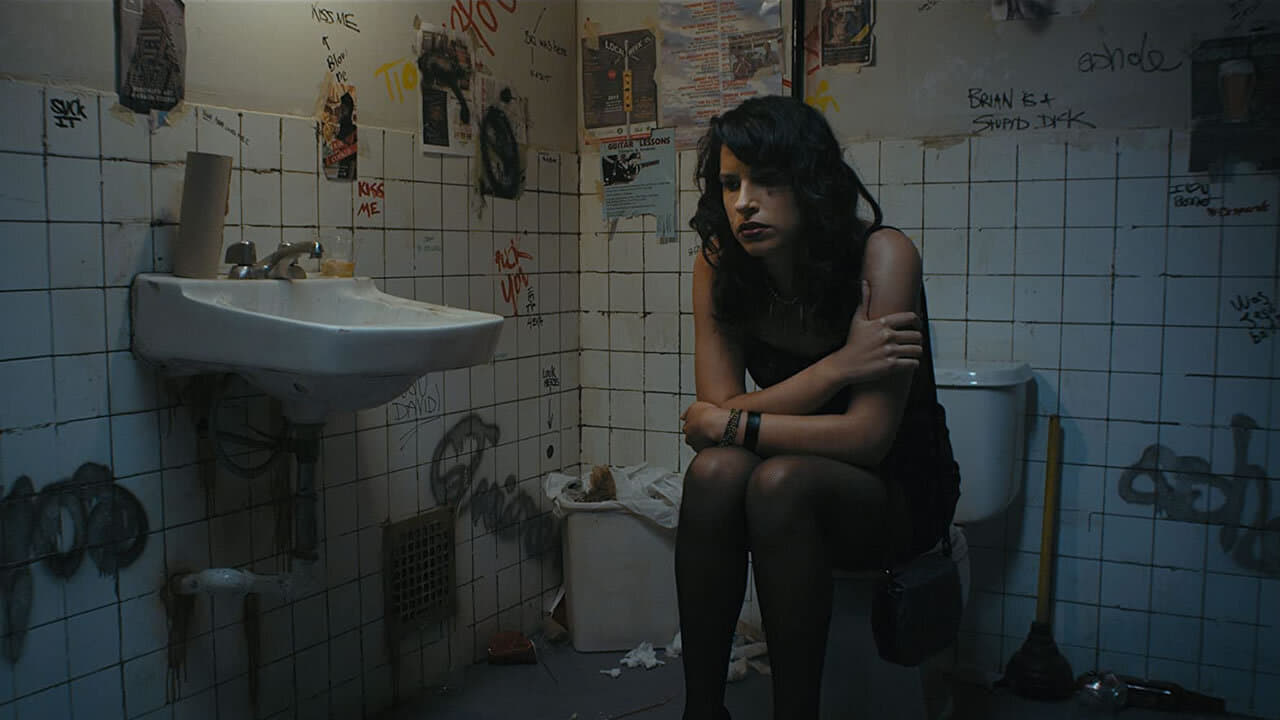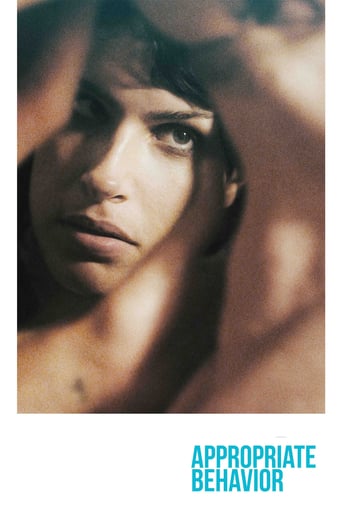

There's a certain type of movie that Sundance always selects: quirky comedies about lovable oddballs who are in the middle of a crisis and want everyone to know about it. This is Appropriate Behavior. I will say in its favour that there isn't enough bisexual representation in cinema nor is there enough about American- Iranians. This has both, but at the same time writer director Desiree Akhavan doesn't want to examine either aspect in depth. This is both refreshing because these aspects of lead character Shirin's identity are assured aspects of who she is and aren't part of her crisis, and frustrating because aside from these elements there is nothing that makes this movie stand out in any way from the quirky indie comedies that come out every year from Sundance. Behavior is about Shirin (played by Akhavan). Recently having broken up with the live-in girlfriend her conservative Persian parents thought was her "roommate" the film plays in pieces as we watch Akhavan try to put her life back together without the woman who defined so much of it. As a bonus we are also treated to flashbacks of the rise and fall of her relationship with her ex. It is... not very exciting. The film is written with so many pithy one liners you can tell it was written to death. This makes for great screencaps and dialogue you can use as gif sets but as an overarching script with characterization not so much. The narrative is fairly elegantly sliced and diced so that you get just the right amount of mix of past and present but at the same time... Just who cares? This feels directly aimed at a group of lost 20 somethings stumbling their way through life, but as a lost 20 something myself I'm sick of seeing these kind of movies (always set in NYC!) and the individual scenes don't really do anything for me. There are still some aspects that make this movie watchable: a threesome that goes wrong (I'm always partial to sex scenes that are good and by good I mean manage to maintain the flow of the story. So many movies just have all plot and emotion stop to get a few thrusts in. Akhavan understands how to continue to build the narrative using the sex scene). The ending of the film is very cathartic and pitch perfect as well. How Akhavan manages to nail some of the most difficult aspects of filmmaking while flubbing the middle is beyond me. It gives me hope however that she'll continue to improve.
... View MoreI was excited to see this indie and for a low budget film in NYC it is quite well done. Being that is was a Sundance film I was expecting something really revelatory. Unfortunately it really wasn't. It took a long time to get going. The whole first half of the film was essentially exposition in the form of complaining. Nothing was really happening to the characters. They weren't doing or experiencing anything. Instead we learn the characters history as she complains about losing her girlfriend to friends and deals with her family dynamic. While none of that is bad per say, it certainly wasn't that engaging.The film picks up speed after that and we get to see our lead actually experience things. However the star/writer/director utilizes flashbacks to tell the tale of how she got here, but the cuts backward and forward have no style, they are just cuts. So the film feels awkward and you get confused as to where you are in time too easily. Maybe it was intentional, as the lead is really off kilter as her life is put in shambles. But for this viewer, it didn't really work. You always eventually figure out where the timeline is, but it takes a while into each new scene to know. There are many ways to make flashbacks and jumping around in time work for an audience, but none of them are used and therefore it's all just basic editing and cutting and it feels clunky.In conclusion, this is a competent first feature. You have to commend anyone who finishes a feature and does so competently. It isn't a perfect movie, but what is? It could have used some more work with the script and structure. Visually it's fine, but again not a revelation in indie cinematography. Can't really fault them for that though, as you only have just so many locations and it is mostly people talking. If you get too artsy with that it can be detrimental to the simple story being told. If you like indies and new filmmakers you could definitely do worse, but you can also definitely do better. For other films in this vein, millennial, edgy indie, OBVIOUS CHILD is far stronger.
... View MoreA new film-making star has been born! This is not an indie movie, this is not an LGBT movie, this is simply great! Ms. Akhavan is so talented on so many levels. This stuff is much better than "Girls" and other similar indie pretentious accounts of white middle-class daughters whose biggest problem in life is that their boyfriends are more handsome than themselves, which makes these girls bloody insecure, and than they comfort themselves with some trashy losers from the street.I love this movie, because it is totally post-indie and post-everything production. Shirin is seemingly a girl who has everything, looks and brain, and even pleasant and pretty nice parents, but who still has real, depressing problem. Her problem is that, due to her age, education and ways of socialisation she is caught up between rapid identity liberalisation, feminism, sexual freedom, on the one hand, and still remains of firm traditional identity constrains, that come from her family background, on the other hand. This is so much a story of current second generation immigrants everywhere in USA, Canada, UK, Germany, France, Scandinavia, etc.Her family is so typical for North American immigrants - they seem to be worldly people, but actually they still know only their original ways and hold on them, as the only source of security. Being familiar to that community, I am so proud someone has finally started telling this story, in relation to NY and these, youngest generation.The second layer of the story, the tension between lesbianism, and bisexuality, is also done very interestingly. It also deconstructs in very subtle way the fashionable urban myth of "bisexuality", as something that is cool for every woman, and belief that, after being in love with a woman, bisexual girls can always successfully replace her with a hot guy, or threesome. Shirin's character so obviously demonstrates that "bisexuality" does not help when a woman loses another woman whom she loves. I actually liked sex scenes a lot in this movie, they were so effective and graphic. I simply can't believe the same person who acted in them, also directed them.I also like the interesting anatomy of her relationship with Maxin, who is seemingly a dorky, unattractive and insecure girl, but actually much stronger than she looks like, and, a real, genuine love of Shirin. Striking contrast between their looks and styles is a great accent in the movie: it underlines the strength of love.And finally, the humor in the movie does not undermine the seriousness of the issue. Conflict with a loving family, which denies the crucial issues of their children, is one of the most painful features of current adulthood, no matter how emancipated and self-focused those people in question are.There are scenes that could have been improved, and we could have seen more of a Shirin's non-Persian friends, who definitely must have influenced her in life. Also, some situations with family could have been more elaborated. Still, this is incomparably better than "Girls", so I hope that this talented young woman will get at least as much chance in this business as a person who wrote "Girls" has got, and I am sure, the screen result will be much more interesting. Kudos to Ms. Akhavan!
... View MoreThis movie is excellent. It's about love, coming of age, queerness, straightness, New York (mostly Brooklyn), living with immigrant parents, so many things. The story telling is unique, witty, and pretty funny. Very dry humor.My one criticism is the chronology. The film could have been either more linear or more clear about the timeline. Although I will say that the editing style was very unique and I enjoyed the lack of Hollywood style conformity. All in all I give this film a solid A. If you like indie films and NY and the story of people's sexuality and life exploration this is a gem.
... View More